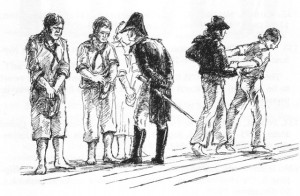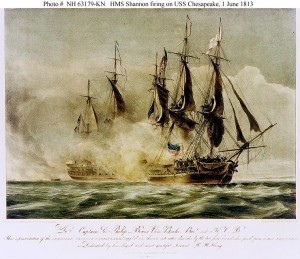Impressment of American Seamen
June 26, 2014 in American History
Most lovers of naval history will already know that the British were famous or rather infamous, for the impressment of British seamen during the late eighteenth century well into the early nineteenth century. Few, however, will remember that impressment of American seamen is often cited as a major contributing factor to the War of 1812. Great Britain’s struggles with Napoleon left her desperate to populate her gigantic navy with the number of seamen necessary to keep it operating. The duties of these seamen were not only hard labor but also emotionally difficult. Meanwhile, at the same time the American Merchant Marines were a much more attractive paid voyage towards both the unknown possible sea battles. American ships offered more comfortable accommodations, better food, and astonishing higher wages compared to their British counterparts. Both deserters of the Royal Navy and other British native seamen soon started flocking not only to American ships, but they also in turn became naturalized American citizens. This was a thorn of contention on both sides of the Atlantic.
The British government’s policy was clear — once a citizen, always a citizen. In turn, they claimed the right to stop American ships and seize seamen upon them and impress them back into their Navy. As bad as that was, it was also problematic because mistakes were frequent and American born seamen were also removed against their will. It was not only a huge big deal to American ship captains and owners of those ships but also problematic because British ships were stopping and searching their ships supposed for deserters. This was also a great outrage publicly when Americans were seized against their will and illegally.
All of this underlying tension came to a head when the United States frigate Chesapeake was stopped by the British Leopard during a British blockade of the Chesapeake Bay in June 1807. This incident snowballed into further British and American confrontations and led to even more crews deserting and a huge disagreement over whether or not these men were actually deserters, or whether or not they were British or American sailors. As the incidents between these two ships and their captain escalated tempers flew. Soon Americans across the nation were outraged at what became known as the “Chesapeake Affair” leading both nations to be on the brink of war. In an effort to avert war negotiations were entered into by 1811. While negotiations continued, war became inevitable both on land and the sea. By the time the H.M.S. Shannon would capture the U.S.S. Chesapeake on June 1, 1813 in Boston Harbor, this war was being battled on all fronts in a slug out to the finish. A little known fact is that by the end of the War of 1812 in 1815, there were no winners or victors despite claims on both sides. In fact, the War of 1812 is one war that altered history dramatically for all parties involved.


J-Hanna said on June 29, 2014
This is a very important history lesson, and I am surprised more people do not know about how the Impressment of Americans lead to the War of 1812.
Jerilee Wei said on July 12, 2014
The entire War of 1812 is very much erased from the American textbooks as merely a chapter in our history to be glossed over especially at the hands of our school systems. Perhaps it is a way of hoping the world will not notice that the events would alter the lives of everyone involved. Native Americans, for example, lost almost everything as a result of this war as it allowed almost every piece of their territory to be opened to white settlement.